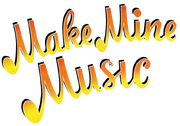Make Mine Music is an animated anthology film produced by Walt Disney Productions that had been distributed by RKO Radio Pictures in New York City, New York on April 20, 1946 and released to theaters nationwide on August 15 of the same year. It is the eighth animated feature in the Disney Animated Canon.
During World War II, much of Walt Disney's staff was drafted into the army, and those that remained were called upon by the U.S. government to make training and propaganda films. As a result, the studio was littered with unfinished story ideas. In order to keep the feature film division alive during this difficult time, the studio released six package films including this one, made up of various unrelated segments set to music. It is the third package film, following Saludos Amigos and The Three Caballeros. It received mixed to positive reviews, though its first segment, The Martins and the Coys, was panned by critics due to its overuse of violence. Review aggregator website Rotten Tomatoes reports that 58% of the critics gave the film a positive review based on 9 reviews, with an average rating of 6.3/10. The musical director was Al Sack. The film was entered into the 1946 Cannes Film Festival.
Film segments[]
This particular is presented as A Musical Fantasy in Ten Parts:
- The Martins and the Coys (A Rustic Ballad) feature the popular radio vocal group, The King's Men singing the story of a Hatfields and McCoys-style feud in the mountains broken up when two young people from each side fall in love. This segment was later cut from the film's U.S. video release due to comic gunplay, although the film's U.K. video release has the segment intact and uncensored. As of 2020, the movie's full uncut presentation with this segment hasn't been released in the U.S. on home media yet or on Disney+ yet.
- Blue Bayou (A Tone Poem) features animation originally intended for Fantasia using the Debussy musical composition Clair de Lune.
- All the Cats Join In (A Jazz Interlude) is one of two segments to which Benny Goodman contributed. An innovative shot in which a pencil draws the action as it is happening, and in which 1940s teens are swept away by popular music. The U.S. video release has a scene from the segment digitally altered to shrink the lead girl's bare bust size for censorship purposes.
- Without You (A Ballad in Blue) is a ballad of lost love, sung by Andy Russell.
- Casey at the Bat (A Musical Recitation) features Jerry Colonna, reciting the famous poem by Ernest Thayer, about the arrogant ballplayer whose cockiness was his undoing.
- Two Silhouettes (Ballade Ballet) features two live-action ballet dancers, David Lichine and Tania Riabouchinskaya, moving in silhouette with animated backgrounds and characters. Dinah Shore sings the title song.
- Peter and the Wolf (A Fairy Tale With Music) is an animated dramatization of the 1936 musical composition by Sergei Prokofiev, with narration by actor Sterling Holloway. A Russian boy named Peter sets off into the forest to hunt the wolf with his animal friends: a bird named Sasha, a duck named Sonia, and a cat named Ivan.
- After You've Gone (And Now the Goodman Quartet) again features Benny Goodman and his quartet (Teddy Wilson - piano, Sid Weiss - bass, Cozy Cole - drums) as four anthropomorphized instruments parade through a musical playground.
- Johnny Fedora and Alice Bluebonnet (A Love Story) tells the romantic story of two hats who fall in love in a department store window. When Alice is sold, Johnny devotes himself to finding her again. The Andrews Sisters provide the vocals.
- The Whale Who Wanted to Sing at the Met (Opera Pathetique) is the bittersweet finale about a sperm whale named Willie with incredible musical talent and his dreams of singing Grand Opera. But short-sighted impressario Tetti-Tatti believes that the whale has simply swallowed an opera singer, and chases him with a harpoon. Nelson Eddy narrates and performs all the voices in this segment. As Willie the Whale, Eddy sings all three male voices in the first part of the Sextet from Donizetti's opera, Lucia di Lammermoor. In the end, Willie is harpooned and killed, but the narrator softens the blow by telling the viewers that he sings on in heaven.
The Talents of[]
- Nelson Eddy - Narrator; characters (The Whale Who Wanted to Sing at the Met)
- Dinah Shore - Singer (Two Silhouettes)
- Benny Goodman - Musician (All the Cats Join In/After You've Gone)
- The Andrews Sisters - Singers (Johnny Fedora and Alice Blue Bonnet)
- Jerry Colonna - Narrator (Casey at the Bat)
- Andy Russell - Singer (Without You)
- Sterling Holloway - Narrator (Peter and the Wolf)
- Riabouchinskaya and Lichine - Dancers (Two Silhouettes)
- Pied Pipers - Singers
- The King's Men - Singers (The Martins and the Coys)
- Ken Darby Chorus - Singers (Blue Bayou)
- John Brown - Umpire (Casey at the Bat)
- Frankie Marvin - Square Dance Caller (The Martins and the Coys)
- Pinto Colvig - Vocal Effects
- Jimmy MacDonald - Vocal Effects
- Thurl Ravenscroft - Singer
Gallery[]
Home video and copyright[]
- Main article: Make Mine Music (video)
Make Mine Music was originally released on laserdisc in Japan on October 21, 1985. The Japanese laserdisc is completely uncut and often sells for over $100 as a result. No unedited release has been scheduled in America yet.
Make Mine Music's sole home video release in the United States was on VHS and DVD on June 6, 2000, under the Walt Disney Gold Classic Collection title. Before, two of its segments were released on home video individually with addition cartoons added to them in the '80s and '90s. This release is edited to remove The Martins and the Coys in it because it has "graphic gunplay not suitable for children", and All The Cats Join In had an edit to shrink the lead girl's bare bust size to make it less vulgar. No other release has been scheduled yet.
European Region 2 DVDs also include the unedited feature but was not released in the United Kingdom, making it the only classic unavailable at the time. It was finally released in the U.K. for the first time on DVD on July 15, 2013, with The Martins and the Coys intact, but still takes the US approach by editing out the sexualized imagery in All The Cats Join In.
In Australia, Make Mine Music never had a legitimate release on VHS or DVD in Australia ever allthough a MOD DVD (Manufactured On Demand DVD) was released in 2006. In December 2020, a boxset containing the first 57 Walt Disney Animation Studios Films was released on DVD and Blu-ray in Australia and the UK. The boxset debuted Make Mine Music for the first time ever on a home video format in Australia as well as The Adventures of Ichabod and Mr. Toad for the first time on DVD in Australia; the latter was previously released on VHS in 1987 (Roadshow Entertainment) and 2000 (Walt Disney Classics Collection).
The film's limited appearance on home media format makes it the rarest in home video availability of all the animated films in the Disney Animated Canon, though Song of the South and Victory Through Air Power which are animation/live-action hybrid films not part of the Disney Animated Canon, do have very limited home video availability like this film (Music Land) in contrast, is the rarest of all, as it was never released on home video yet.
As of November 2021, Make Mine Music is the only film in the Disney Animated Canon that has not been available on the service at this time on Disney+. The film was released as an exclusive Disney Movie Club Blu-ray release on November 2, 2021 in the US. Despite explicit reports by Disney's customer service confirming this release would be uncut and explicitly mentioning that the release would include all ten musical segments, the actual discs contained the 2000 censored version of the film, editing opening titles inconsistently along with the removal of the Martins and Coys sequence and the edits in the All the Cats Join In sequence (possibly due to a last minute change). Packaging also inconsistently includes content warnings while mentioning nine sequences to be included.
The film's copyright was renewed on April 9, 1973.[1]
In Disney Parks[]
- The Peter and the Wolf segment is featured as part of the Disneyland Paris version of the Storybook Land Canal Boats.
- Casey at the Bat is represented in the parks with Casey's Corner on Main Street, U.S.A. in various parks and one of the Boardwalk games at Disney California Adventure.
- Willie the Whale appears in a queue poster at Mickey's PhilharMagic.
- The scene from the After You've Gone segment where multiple multicolored balls rained down on the clarinet represented Make Mine Music in the Back to the Past segment of Wonderful World of Animation.
- The music of Casey at the Bat can be heard in Mickey's Toontown (Disneyland) and Toontown (Tokyo Disneyland) as a background area.
References[]
External links[]
| v - e - d | ||||||||||
|---|---|---|---|---|---|---|---|---|---|---|
|



